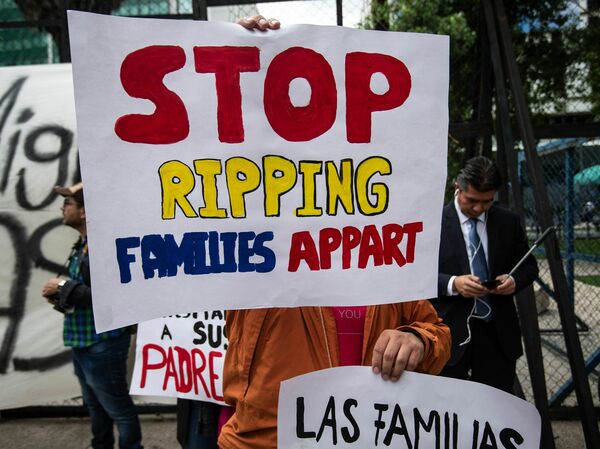U.S. government agrees to settlement with migrant families separated at the border
Go Deeper.
Create an account or log in to save stories.
Like this?
Thanks for liking this story! We have added it to a list of your favorite stories.

The U.S. government has agreed to compensate thousands of migrant families who were forced apart at the southern border in 2017 and 2018 as part of the Trump administration's "zero-tolerance" policy.
The class-action settlement with the ACLU was filed Monday in federal court in San Diego. It's a milestone in the years-long battle over family separations.
More than 5,000 families crossing the U.S.-Mexico border were separated. Children were taken to juvenile centers while parents were prosecuted and often deported. Images of children alone in detention facilities generated outrage; the youngest child separated from their family was only 6 months old at the time. The Trump administration was essentially forced to halt the policy.
What's in the settlement?
The deal, which needs to be approved by U.S. District Judge Dana M. Sabraw, bars immigration officials from imposing a blanket policy of family separation for the next eight years. Homeland Security Secretary Alejandro Mayorkas signaled that the current White House has no plans to split apart families. "It is vital that we adhere to our country's fundamental values, and we will not deviate from that," he told NPR.
Turn Up Your Support
MPR News helps you turn down the noise and build shared understanding. Turn up your support for this public resource and keep trusted journalism accessible to all.
However former President Donald Trump, the front-runner for the Republican presidential nomination, has refused to rule out reinstituting the family separation policy if he's re-elected. "If a family hears that they're going to be separated, they love their family, they dont come," Trump said during a town hall in May. "I know it sounds harsh."
The settlement also specifies that families who were separated will get an interview with an asylum officer briefed on their experience. They'll also get work authorization and housing benefits.
Mayorkas said families will be given access to mental health resources. "I have met with reunited families," he said. "The trauma does not end with reunification. There is a great deal of healing needed. And we are committed to doing that which is to necessary to restoring these individuals, their health and well-being."
What about families that haven't been reunited yet?
While most of the separated families have since been reunited, up to 1,000 children are still not with their parents, according to the ACLU. More than five years after the policy ended, these children remain scattered across the U.S., living with extended relatives, family friends or under state supervision.
Lee Gelernt, the ACLU's lead counsel in this case, blamed the Trump administration's record keeping.
"The court said it appears that the Trump administration tracked property more diligently than they tracked the whereabouts of little children," he said. "We have been searching for years for these families."
Monday's settlement stipulates that the U.S. government will continue to pay to help reunify families who are still separated. This includes finding parents and guardians who were deported and bringing them back to the U.S.
Will any of these families get financial compensation?
This settlement does not give monetary compensation. Officials ended those negotiations back in 2021, after Republican lawmakers expressed outrage, saying the amounts under consideration were too high.
Copyright 2023 NPR. To see more, visit https://www.npr.org.


